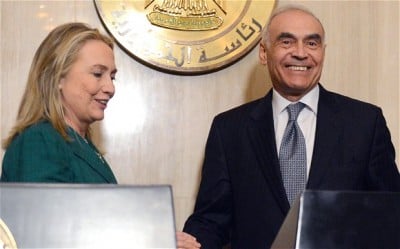US and Egypt announce ceasefire in Israeli assault on Gaza

US Secretary of State Hillary Clinton and Egypt’s Foreign Minister Mohamed Amr formally announced a ceasefire between Israel and Hamas Wednesday evening, at least temporarily ending the eight-day Israeli onslaught that killed over 140 people.
After having green-lighted a ceaseless bombardment for the last eight days of densely populated Gaza neighborhoods, the Obama administration intervened out of concern that the conflict could threaten its broader interests in the region—including the campaign against Syria and plans for war against Iran.
The ceasefire is highly tenuous. While the main Palestinian factions in Gaza, Hamas and Islamic Jihad, have agreed to halt rocket attacks on Israel, Israel has demanded that Egypt guarantee and enforce the ceasefire. This implies that Cairo ensures that no weapons, in particular no long-range rockets, like the Iranian Fajr 5, are transported into Gaza via the Egyptian-controlled Rafah crossing. This in turn means that Egypt must deploy personnel to police Gaza on Israel’s behalf.
The agreement calls on Israel to halt all attacks on Gaza, including “targeting of individuals,” i.e., extra-judicial assassinations. The London-based Al Hayatnewspaper, run by the Saudi regime, cited Hamas and Islamic Jihad as saying that Israel wanted a 90-day period to determine their “good intentions”—providing Israel with an excuse to restart its assault at any time.
Israel is also supposed to begin removing restrictions on movement through Gaza, but there are no details on how this is to take place.
Fully 75,000 troops are massed on Israel’s border, far more than were involved in that of Operation Cast Lead in 2008-09. This suggests possible plans for a troop deployment to Israel’s northern border with Lebanon, Syria’s Golan Heights which Israel has occupied since the 1967 war, and possibly to the West Bank.
An escalating conflict would cut across Washington’s preparations for a military intervention by its regional proxies to topple the regime of Bashar al-Assad in Syria, an action that is considered vital to the isolation of Iran. The US-backed campaign against Assad is dependent on the support of Turkey and a number of Arab countries in which opposition to the Israeli attack on Gaza is overwhelming.
Chief among the US allies in the region is Egypt itself. Egypt’s Prime Minister Mohamed Mursi of the Muslim Brotherhood played a critical role in brokering the deal, working closely with Clinton. Clinton acknowledged Mursi’s crucial role in the negotiations and thanked him for “assuming the leadership that has long made this country a cornerstone of regional stability and peace.”
Cairo is dependent upon Washington, the International Monetary Fund and US allies in the Gulf for billions in military aid and loans to cover its burgeoning deficit. An escalating conflict threatens to intensify social conflict within Egypt and undermine the position of Muslim Brotherhood government. Washington also has no interest in seeing the resumption of protests in Egypt like those that led to the downfall of the Mubarak regime in February.
Israel’s Prime Minister Benjamin Netanyahu issued a statement saying that he had spoken to President Obama and “responded positively to his recommendation to give a chance to the Egyptian proposal for a ceasefire and to allow an opportunity to stabilize the situation and to calm it down before there is a need to use much greater force.”
Hamas, the Palestinian Islamist faction and offshoot of the Muslim Brotherhood, was only recently persuaded by its Egyptian parent to abandon its political base in exile in Syria’s capital Damascus and move to Doha, Qatar, which is in the forefront of the regional alliance of Sunni regimes against Syria. This shift has made Hamas more susceptible to direct pressure from Cairo and the Gulf monarchies.
The Israeli military has accomplished much of the goal of degrading Gaza’s infrastructure through bombardment, with the destruction of nearly 1,500 targets since November 14 and the killing of more than 140 Palestinians, mainly civilians, including at least 34 children.
Israel was allowed to prolong the talks by Washington so that it could continue its campaign of destruction. On Wednesday, its forces launched over 100 bombs and missiles, killing more than a dozen Palestinians. It pulverised a number of Gaza’s government buildings, including the Ministry of Internal Security. An F-16 fighter jet dropped a bomb near hotels housing international journalists, blowing out their windows and creating a 20-foot crater. It also targeted offices belonging to Al Jazeera.
Palestinian fighters fired 760 rockets that struck Israel, with Israel’s anti-missile system, the Iron Dome, intercepting a further 400, according to Israeli accounts. These rockets killed five Israelis, including one soldier. On Wednesday, a bomb planted in a bus in downtown Tel Aviv exploded, injuring at least 27 Israelis, the first such incident since 2006. The Popular Front for the Liberation of Palestine-General Command claimed responsibility for the bus bombing.
The Israeli onslaught against Gaza is an element in Washington’s and Israel’s broader war aims in the Middle East, particularly in relationship to Iran. One of the Netanyahu government’s main goals in launching the offensive was to signal its intentions with regard to Iran and whip up war sentiment in the Israeli public. It has accused Iran of being the main force in supplying weapons to Hamas.
Turkey’s Foreign Minister Ahmet Davutoglu was also in Cairo to “mediate” between Israel and Gaza on Washington and Israel’s behalf. The key concern of Ankara was to prevent an Israeli invasion of Gaza from precipitating mass popular opposition throughout the region that could coalesce with mounting anger over social inequality and cut across the war plans against Syria and Iran, and possibly even threaten the Islamist regimes own survival.

